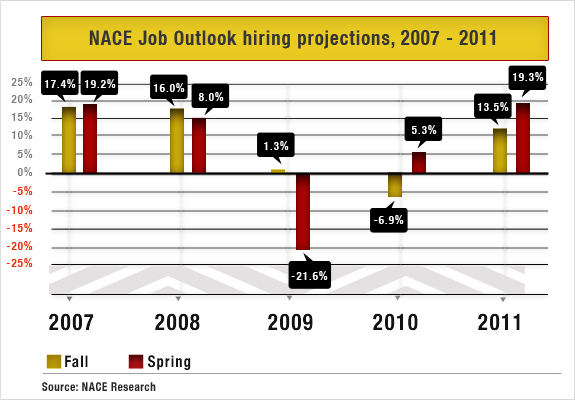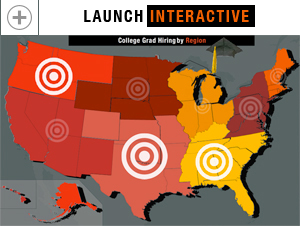Here’s a graduation surprise for the Class of 2011: They may actually get jobs.
Economists, experts in college recruiting and job placement officers around the country say the employment outlook for new grads is brighter than it has been since the Great Recession began in 2007. But this bit of good news doesn't solve one of the worst unemployment rates among young people in decades. “It is a great improvement over the last two years,” says Philip D. Gardner, director of research for the Collegiate Employment Research Institute at Michigan State University, which conducts an annual survey of 4,600 employers about their hiring plans. Gardner cautions, however, that like the rest of the economy the college job market will take years to fully recover.
Still, this year’s grads have something to celebrate. Employers are expected to hire 19 percent more grads than they did last year, according to an April survey by the National Association of Colleges and Employers (NACE). The job market has steadily increased during the school year, according to NACE, which had projected only a 13 percent increase in hiring at the beginning of the academic year.

Job placement officers at a variety of campuses echoed the improving national statistics. “We’ve had a 20 percent increase in the volume of campus recruiting this year,” says Stacie Hagenbaugh, director of Career Development at Smith College, the private liberal arts school for women. “Now we’re seeing hiring on the uptick.”
At Clemson University, a public school in North Carolina, hiring of new grads began to edge up last year. “This year it’s going up even more,” says Flora Riley, Clemson’s executive director of Career Services. Although it’s still early, 27 percent of Clemson’s graduating class has accepted a job, she says, a tick up from 25 percent at this time last year. But Riley adds that the number may understate the actual strength of the job market. “This particular class is taking their time to decide a little more,” she says. “In past years they had to take whatever they could get.”
Research backs up Riley’s interpretation. Overall, 41 percent of this year’s seniors who applied for a job had received an offer, up from 38 percent of the class of 2010. Yet the same level as last year – 24 percent – say they had accepted jobs. “This year’s graduates are a little more willing to hold out for a different job offer,” according to Marilyn Mackes, NACE’s executive director.
That’s the case for Patrick Schiebe, 21, who is graduating from Louisiana State University (LSU) with a B.S. in business administration. He hasn’t yet accepted a job, but is having serious discussions with several employers. “I know it will not be hard for me to find a job,” Schiebe says, “but I would really like to find the right job for me.” Schiebe says he is holding out for a decent starting salary and really wants to “enjoy going to work every day.” However, he realizes the market is competitive and plans to make a decision sometime over the summer.
Not all grads will have the same number of options. Hiring is concentrated among big corporations that have delayed adding new employees during the recession and smaller, fast-growth companies, according to Gardner’s survey. And although the college labor market is recovering nationwide, demand varies by region, and students who are able to follow the jobs will have a better chance of finding employment. Among the good news: Hiring will improve in the Great Lakes states, which were hard-hit by the recession.

Some majors are hotter than others. As in past years, demand is highest for students with degrees in engineering and business, with 25 percent of companies saying they’d prefer those grads to fill their positions, according to Gardner. But 36 percent of companies say they would consider a graduate with any major for a position, and 16 percent of employers surveyed will seek liberal arts grads.
“It’s a much more optimistic picture,” says Dr. Katharine S. Brooks, Director of Liberal Arts Career Services at The University of Texas at Austin. At a job fair on the Austin campus last month, Brooks says she saw a flurry of last-minute activity on the part of recruiters. Students reported that companies were following through about specific jobs more than in past years. “We’re not talking about the dotcom boom, but it’s definitely better to be graduating in 2011 than in 2010,” says Brooks.
And while it seems like this year’s grads would face stiff competition from graduates of the past years who haven’t found meaningful jobs, placement experts say it doesn’t work that way. “More than one employer has told me it’s just easier to recruit on campus, easier to take somebody that’s going to graduate this year,” says Gardner. That’s especially tough since the average senior in 2009 graduated with $24,000 in debt, according to the Project on Student Debt. Despite those hurdles, college grads overall are faring much better than less educated workers. In April, the unemployment rate for those with a Bachelor’s degree or higher was 4.5 percent; the rate for high school graduates without any college was 9.7 percent, according to the Bureau of Labor Statistics.
The news only is likely to get better for the class of 2012. Gardner says the number of on-campus postings for paid internships has tripled compared with last year, which is usually a precursor to increased hiring. He says he is also seeing companies hiring human resources professionals, another sign employers may be gearing up to hire. “Right now we are seeing a slow drive in the right direction,” says Riley of Clemson. “But I predict next year will be a break away year.”
Related Links:
MBA Job Outlook Strong for Grads (Bloomberg Businessweek)
Hiring Outlook Improves for Class of 2011 (Huffington Post)
How to Weed Out the Recent Grads Who Aren’t REALLY Passionate (Business Insider)


